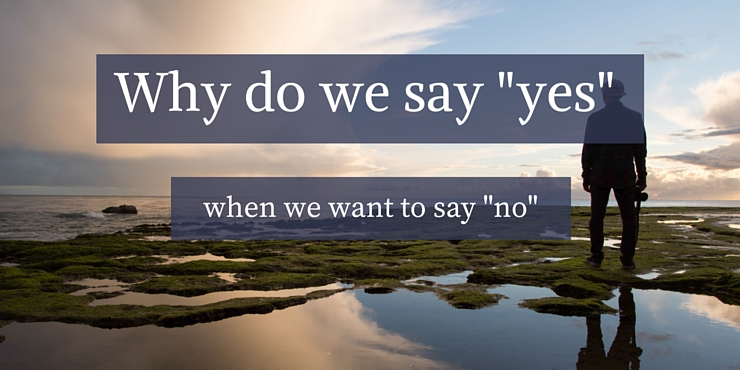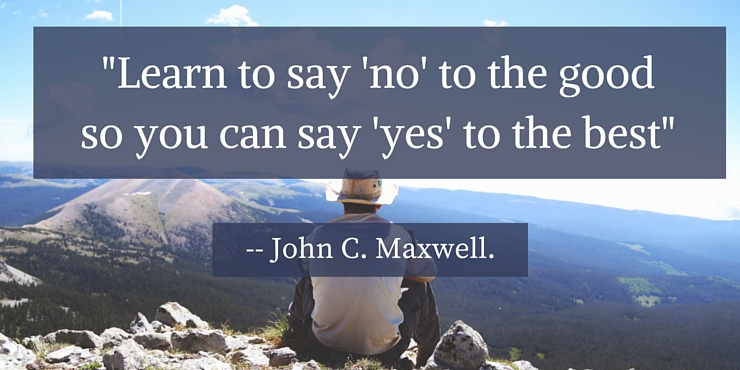It’s common sense that the word “No” it’s always harder to be pronounced. When it comes to either go to your favorite restaurant or go to that fast food your friends always want to go, many times you’ve said say “Yes, of course. Let’s all have a burger there”, even if you didn’t want to.
This mundane example opens up the topic about how life has made so hard to say “no” while, at the same time, not feeling either ashamed, sorry or like we’re missing out on something. Lacking a culturally-reinforced skill of being able to say “No” is something that can quickly turn our life, both personal and professional, into a living hell.
So why do we say “Yes” when we want to say “no”?

Linda Adam, President and CEO of Gordon Training International, lists the most common scenarios in which we all fall for that. Specifically, we tend to say “Yes” because of:
- Desire to please. “What will she think of me?” “I know it would make them happy.”
- Fear of hurting someone. “I don’t want to disappoint her.” “I’m afraid I’ll hurt his feelings if I don’t go.”
- Guilt. “I’d feel so selfish.” “How could I turn them down?”
- Surprise. “Well, I guess I could do it.” “I don’t know…well, O.K.”
- Deference to authority. “She’s the boss.” “Yes, sir!”
- Reciprocation. “I may need the same sometime.” “She’d do it for me.”
- Duty. “I ought to…” “I should…” “I owe it to them.”
- Need for power. “If I say ‘no’, they’ll think I can’t handle it.” “Now he’ll owe me a favor
And, believe it or not, many of these can perfectly apply to your freelancing and professional life.
Just a quick example here: you picked that project because it was your friend’s girlfriend, who’s teaching in kindergarten, and people teaching to kids can’t be hard to work with – you naive, dumb freelancer!. So you created that small website for that project. But it was a real PIA. Now you’ve learned your lesson.
You said “Yes” and that word made you almost break your friendship with that lady, it filled up your soul with regret, and you still don’t know if you made some money out of it or not.
So why did you say “yes” to that? Probably because you underestimated how many efforts would have been required, and you didn’t want to let down your friend. Plus, you slightly felt guilty because it was something super easy to do and you felt that, if you didn’t take that project, your friend could be hurt by that.
Why saying “Yes” is ruining your freelance life
There’s a famous quote from Richard Branson, Virgin’s Ceo, that reads:
If somebody offers you an amazing opportunity but you are not sure you can do it, say Yes – then learn how to do it later!
Well, I half-agree with it, but it’s not with the “Yes” part because accepting projects and works that aren’t a good fit for you could really be something bad. As a freelancer, you need to understand there are limits to what you could say “Yes” to.
With an ongoing stream of “Yes” to bad projects, or what social psychologist Susan Newman calls it “a yes treadmill”, your freelance career will be sentenced to death.
Why saying “No” is a freelancer’s best tool to thrive

When you’d just started and were in your early months of your freelancing life, it was so difficult not to accept projects you weren’t interested in, low-paid ones or “you’ll get a ton of exposure” jobs, which means free jobs for them and no money coming your way.
This approach relies on inexperience, not smartness.
Robert Siegel, General Partner at XSeed Capital, perfectly sums it up: “one of the most useful tools a person has is the power to say “No” to things that are taking up time but are not adding much value to one’s life.”
When evaluating if that project is something worth working on, ask yourself: is that project adding anything I value to my life?
The two immediate benefits of saying “No” as a freelancer
1. Saying “No” sets boundaries
Saying no, or at least, starting to consider whether that project or request would be worth following through, lets you create boundaries. And boundaries are your best friends when it comes to knowing what to answer to business proposals.
Building up boundaries enables you to perfectly and quickly respond to the type of work you’re interested in, knowing which price range works for you, the time you’ll need to execute on it, how that project will fit your working schedule and so on.
2. Saying “No” prevents you from wasting your resources (mostly time)
Thanks to boundaries, you’ll be at your best to evaluate whether a project fits your business path and life values. An excellent example of this approach, believe it or not, can be found in Jared Leto’s words. The singer-actor-investor explained his strategy to FastCompany some while ago this way:
Whatever you do, you have to have deep interest and desire and passion, or you shouldn’t be doing it. My work is never a job. My work is my life. If you work your fucking ass off, you can get a lot done.
How to say “No” politely and professionally (scripts)
We all have bills to pay, and sure it looks scary saying “No” to a new project coming your way. But that is just a slight fear or concern based on short-sight vision. Nobody wants to sound rude, nor impolite and we end up saying stuff such as “I’m super busy, but I’ll see what I can do about it. I’m sure I can squeeze it in”.
Please stop doing that, you’re hurting your freelance career and your life eventually.
Again, if saying “No” might sound a tough action to take, how about you give it “a twist2 and use others words to say you’re not interested in THAT project while keeping your answer conveying a positive sense.
James Chartrand, expert copywriter and owner of Men with Pens, provides some terrific real-life examples you should try:
- “I really appreciate that you offered me this job, but I’m all tied up with [insert project]”
- “I’d love to, but I really have to [insert action here]”
- “I’m already working on [insert task here] but I can [offer alternative]”
- “That would be great, but I’ve already committed to [insert event]”
- “My schedule is booked until the [date]. How about then?”
You see? There’s no negative form in these examples, and they all reads in a natural way. When you decline a project, it all comes down to being professional and honest with the prospect.
7 signs that urge you to say a big fat “No”
We don’t see the future or how things might turn into, and your freelance experience would probably be different from that of other freelancers. Being able to assess and better qualify your freelance projects is a crucial skill you should be improving from day one and never stop doing it.
What I can tell you, though, is that no matter how experienced you are, there are some proven signs that can help quickly spot projects and clients that might do more harm than good to you.
Here are the 7 most common ones:
- If the client asks for an (almost) impossible set of things or tasks
- If there’s no budget at all and the client doesn’t show any interest in giving you a number after you talked to them
- If the project doesn’t fall under your area of expertise
- If you’re not 100% sure, you’ll be able to stick to its deadline
- If you don’t want your name and your business to be associated with that project/client
- If the client keeps adding tasks or asks for “small tweaks” not previously discussed but after you provided a quotation (also know as “scope creepers)
- If the client says anything similar to “it should be an easy task”, “it shouldn’t take too much time”, “You can do [task] in 15 minutes, [task 2] in 5 minutes, so the whole thing shouldn’t take you more than 30 minutes.”
If you happen to experience any of these, use those two letters and you won’t regret it.
Wrapping things up
The world is full of Yes-men, allegedly professionals that take in on any project, with no minimum understanding of the client’s needs, always providing a low-quality outcome. They say “Yes” to everything that falls under their radar; it’s their business model. If that’s something you’re interested in, keep saying “Yes” and you’ll be one of those Lemmings.
While on the other hand, if you’d like to make a huge change in your freelancing life, start saying “No” with your next prospect. The word “No” sets you apart from everybody else, and empowers you back by enabling you to choose which project or client you want to work with.
Once you learn to say “No”, you’ll face the world with a renewed meaning of the word “Yes”. And from that moment on, each time you’ll say “Yes” to a project it’ll mean you’ve insightfully chosen to do that work, and you’ll devote all of your professional experience into crafting the best outcome possible.
With better projects under your belt, on top of a fulfilled professional life, you’ll be able to provide much more value to your clients. Therefore, quote higher. And that’s something a Lemming will never understand.
Now it’s your turn: When do you say “No” to a client/project? How did you learn to do that?
 Dream It
Dream It
